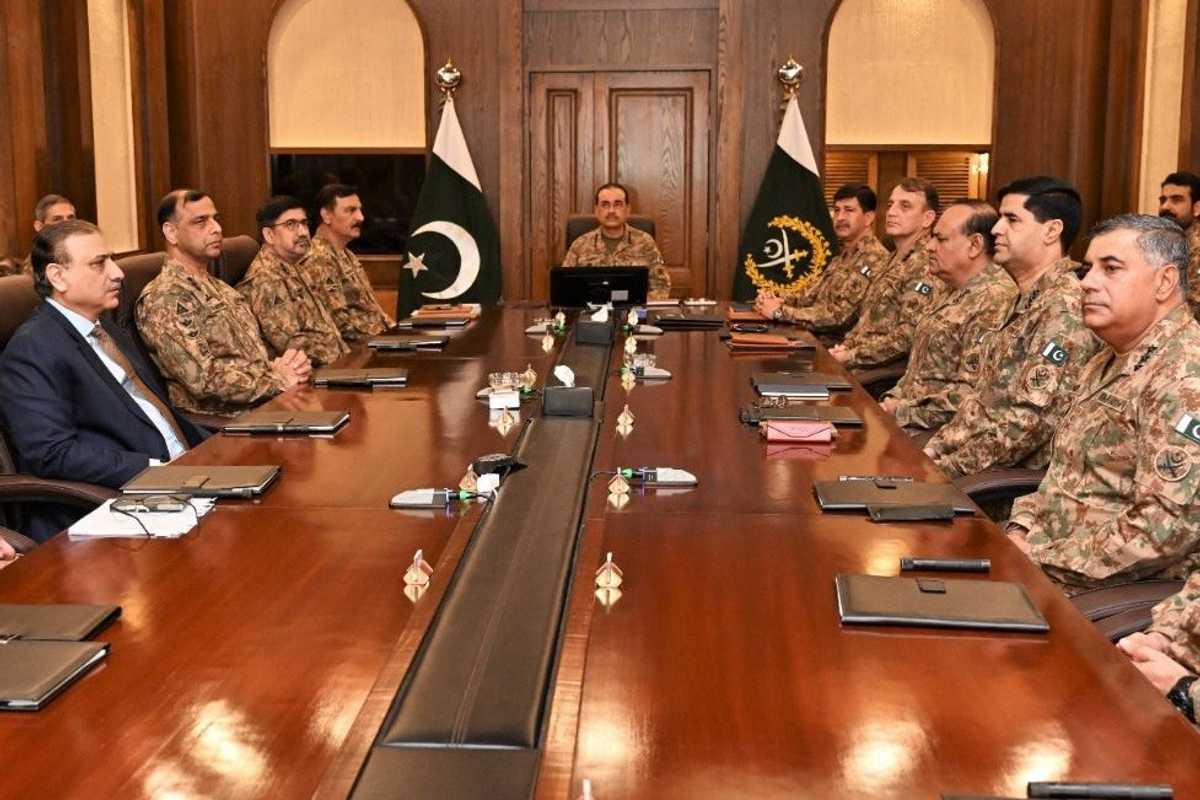Pakistan military says India using Pahalgam attack to divert from Islamabad’s gains
Such diversionary tactics aimed at providing operational breathing space to Indian terror proxies will never succeed, says ISPR
News Desk
The News Desk provides timely and factual coverage of national and international events, with an emphasis on accuracy and clarity.

Army Chief Gen. Asim Munir chairing a Special Corps Commanders’ Conference at GHQ, Rawalpindi on Friday, May 2, 2025.
ISPR
Pakistan’s military on Friday accused India of using the deadly Pahalgam attack as a diversionary tactic to shift attention from Islamabad’s progress on its western front and economic recovery efforts.
In a statement issued after a high-level meeting of military commanders in Rawalpindi, the Pakistan Army said, “Such diversionary tactics aimed at providing operational breathing space to Indian terror proxies will never succeed.”
The meeting, known as a Special Corps Commanders’ Conference, was chaired by Chief of Army Staff General Syed Asim Munir at army headquarters.
The Pahalgam attack, which took place in Indian-administered Kashmir on April 22, has reignited tensions between the two nuclear-armed neighbors. India quickly blamed Pakistan for the assault — a charge Islamabad rejected, calling instead for an independent international investigation and dismissing the accusations as unsupported by evidence.
In a series of moves following the incident, Indian Prime Minister Narendra Modi granted his military “operational freedom,” suspended the decades-old Indus Waters Treaty, and ordered Pakistani nationals to leave India within 48 hours.
Islamabad condemned the actions as provocative and unlawful. Officials warned that any unilateral move to alter the treaty — which governs the sharing of river waters between the two countries — would be treated as an “act of war” and met with strong resistance.
The military meeting in Pakistan reviewed the current regional security situation and rising tensions with India. The army’s top leadership reaffirmed its resolve to protect Pakistan’s sovereignty and territorial integrity against any aggression.
Gen. Munir praised the armed forces’ operational preparedness and unity with the public. He stressed the need for heightened vigilance across all military fronts.
The army expressed concern over what it called an increase in Indian abuses in Indian-administered Kashmir and the targeting of civilians along the Line of Control. It warned these “inhumane and unprovoked acts” would escalate tensions and would be met with “a resolute and proportionate response.”
The army said India had a history of using crises to pursue political and military objectives. It drew parallels with the 2019 Pulwama attack, which New Delhi used to revoke Article 370 and change the status of the disputed territory.
“The Pahalgam episode appears to be part of a deliberate strategy to divert Pakistan’s focus from the western front and economic revival — two areas where Pakistan is decisively gaining ground,” the army said.
The commanders also accused India of trying to undermine the Indus Waters Treaty by “weaponizing water,” saying such actions threaten the livelihoods of over 240 million Pakistanis and regional stability.
They expressed alarm over what they described as credible evidence of Indian military and intelligence involvement in terrorist activities inside Pakistan — actions the army said violate international norms.
While reiterating a commitment to peace, the forum warned that any imposed war would be met with a “sure and decisive” response. It concluded with Gen. Munir expressing confidence in the military’s readiness and resolve to defend the country against threats.
COAS vows ‘swift response’
Yesterday, Gen. Munir had warned that any military misadventure by India would be met with a “swift, resolute, and notch-up response,” as both sides navigate heightened hostilities.
In a show of military readiness, he visited the Pakistan Army’s Mangla Strike Corps during “Exercise Hammer Strike” -- a high-intensity field training exercise on Thursday.
According to the military’s media wing, Inter-Services Public Relations (ISPR), the drill was designed to demonstrate operational preparedness.
Gen. Munir’s remarks echo the position of Pakistan’s National Security Committee (NSC), which, in its April 24 huddle, called on India to abandon its “reflexive blame game and cynical, stage-managed exploitation” of attacks like the one in Pahalgam to serve narrow political ends.
The NSC had warned that any threat to Pakistan’s sovereignty or the safety of its people would be met with firm and reciprocal measures “across all domains.”
Disputed region
Kashmir, a Muslim-majority Himalayan region, is held by India and Pakistan in parts and claimed by both in full. A small sliver of Kashmir is also held by China.
Since they were partitioned in 1947, the two countries have fought three wars – in 1948, 1965, and 1971 – two of them over Kashmir.
Also, in the Siachen glacier in northern Kashmir, Indian and Pakistani troops have fought intermittently since 1984. A cease-fire came into effect in 2003.







Comments
See what people are discussing